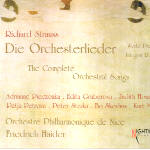I approached this three-disc set with great enthusiasm. Richard Strauss composed orchestral songs throughout his entire career–from 1885 to 1948–and they are fascinating, sometimes as miniatures, sometimes as (almost) mini-operatic scenes. (He actually orchestrated only 42 of the 47 songs presented here; five were set by Robert Heger, Felix Mottl, and Leopold Wenninger.) I was familiar with about 30 of them yet had never heard the two composed for bass voice or the seven for tenor, for example; and especially in the case of the latter, I was wondering if they contained more wonderfully difficult tenor-writing à la Bacchus in Ariadne, the Emperor in Frau, and Apollo in Daphne.
The 47 selections (46, actually–“Zueignung” is sung twice, once in Strauss’ own orchestration and once in Heger’s) are spread among seven singers: 16 are given to soprano Adrianne Pieczonka, 11 are sung by Edita Gruberova, while Judith Howarth and Peter Stryka each perform seven, baritone Bo Skovhus takes three, bass Kurt Moll sings two, and mezzo Petja Petrova sings only one–the 16-minute-long “Notturno”. This last-mentioned is a remarkable work, harmonically somewhere between Debussy and the Strauss of Elektra, with a text about the personification of death. Petrova, whose voice is simply too light, does what she can with it; we can only imagine how a singer like Christa Ludwig could involve us in its eerieness.
The heaviest burden lies on Pieczonka’s shoulders, not only in numbers of works, but in familiarity as well–and comparisons do her very little good indeed. She sings the “big” (i.e, hochdramatische) songs–The Four Last Songs, Gesang der Apollopriesterin, Die heiligen drei Konige, and others, and sad to say she finishes last in most analyses. She has neither the vocal heft nor allure to put these songs across; just where the voice is required to soar, she seems to need to retrench. One would be hard pressed to point out specific flaws, but she doesn’t impress, either.
Gruberova is a known quantity but is not at her best here; she often veers from the pitch and generally sounds tentative. Judith Howarth tackles, among others, the symphonic, huge Fruhlingsfeier, and she does pretty well with it; still, one longs for a more opulent sound. Baritone Bo Skovhus tries to imbue his songs with feeling and an inner tension and he succeeds in The Pilgrim’s Morning Song but remains somewhat wan elsewhere. Peter Stryka disappoints–period; his voice is light and appealing, but most of his songs are heroically conceived and he simply does not produce the right sounds. We can imagine what a well-focused, lyrical voice like Fritz Wunderlich’s might have done with the uplifting The Poet’s walk at Eventide. Kurt Moll is marvelous in his pair of songs, the first a sort-of hymn to Nature with prominent woodwinds; the second, a contemplation on loneliness.
Throughout, Friedrich Haider leads the Orchestre Philharmonique de Nice with a knowing hand, although his tempos are occasionally rushed (for the singers’ benefits?) and his orchestra is hardly the New York or Berlin Philharmonic. Recorded sound tends to favor the voices a bit much. I regret that this review is as negative as it is; this set has intrinsic value and I have no intention of doing without it. I recommend it to any and all who love Richard Strauss, but with the sad comment that, for the most part, it could have been better. And when will another label be willing to take this project on again? Well, half a loaf…
































